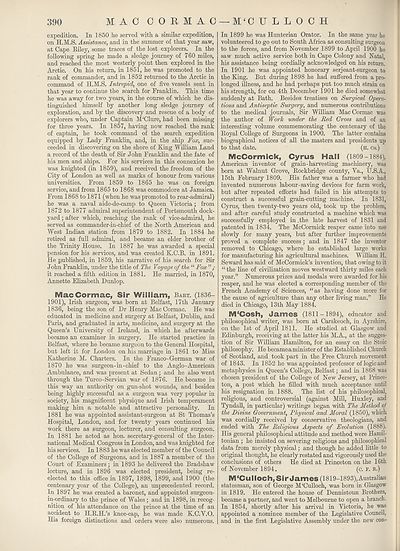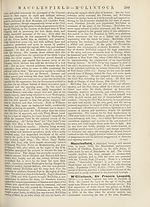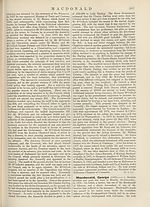New volumes of the Encyclopædia Britannica > Volume 30, K-MOR
(420) Page 390 - MAC
Download files
Complete book:
Individual page:
Thumbnail gallery: Grid view | List view

390 MACCORMAO
expedition. In 1850 he served with a similar expedition,
on H.M.S. Assistance, and in the summer of that year saw,
at Cape Riley, some traces of the lost explorers. In the
following spring he made a sledge journey of 760 miles,
and reached the most westerly point then explored in the
Arctic. On his return, in 1851, he was promoted to the
rank of commander, and in 1852 returned to the Arctic in
command of H.M.S. Intrepid, one of five vessels sent in
that year to continue the search for Franklin. This time
he was away for two years, in the course of which he dis¬
tinguished himself by another long sledge journey of
exploration, and by the discovery and rescue of a body of
explorers who, under Captain M‘Clure, had been missing
for three years. In 1857, having now reached the rank
of captain, he took command of the search expedition
equipped by Lady Franklin, and, in the ship Fox, suc¬
ceeded in discovering on the shore of King William Land
a record of the death of Sir John Franklin and the fate of
his men and ships. For his services in this connexion he
was knighted (in 1859), and received the freedom of the
City of London as well as marks of honour from various
universities. From 1859 to 1865 he was on foreign
service, and from 1865 to 1868 was commodore at Jamaica.
From 1868 to 1871 (when he was promoted to rear-admiral)
he was a naval aide-de-camp to Queen Victoria ; from
1872 to 1877 admiral superintendent of Portsmouth dock¬
yard ; after which, reaching the rank of vice-admiral, he
served as commander-in-chief of the North American and
West Indian station from 1879 to 1882. In 1884 he
retired as full admiral, and became an elder brother of
the Trinity House. In 1887 he was awarded a special
pension for his services, and was created K.C.B. in 1891.
He published, in 1859, his narrative of his search for Sir
John Franklin, under the title of The Voyage of the “ Fox ” ;
it reached a fifth edition in 1881. He married, in 1870,
Annette Elizabeth Dunlop.
MacCormac, Sir William, Bart. (1836-
1901), Irish surgeon, was born at Belfast, 17th January
1836, being the son of Dr Henry MacCormac. He was
educated in medicine and surgery at Belfast, Dublin, and
Paris, and graduated in arts, medicine, and surgery at the
Queen’s University of Ireland, in which he afterwards
became an examiner in surgery. He started practice in
Belfast, where he became surgeon to the General Hospital,
but left it for London on his marriage in 1861 to Miss
Katherine M. Charters. In the Franco-German war of
1870 he -was surgeon-in-chief to the Anglo-American
Ambulance, and was present at Sedan; and he also went
through the Turco-Servian war of 1876. He became in
this way an authority on gun-shot wounds, and besides
being highly successful as a surgeon was very popular in
society, his magnificent physique and Irish temperament
making him a notable and attractive personality. In
1881 he was appointed assistant-surgeon at St Thomas’s
Hospital, London, and for twenty years continued his
work there as surgeon, lecturer, and consulting surgeon.
In 1881 he acted as hon. secretary-general of the Inter¬
national Medical Congress in London, and was knighted for
his services. In 1883 he was elected member of the Council
of the College of Surgeons, and in 1887 a member of the
Court of Examiners; in 1893 he delivered the Bradshaw
lecture, and in 1896 was elected president, being re¬
elected to this office in 1897, 1898, 1899, and 1900 (the
centenary year of the College), an unprecedented record.
In 1897 he was created a baronet, and appointed surgeon-
in-ordinary to the prince of Wales; and in 1898, in recog¬
nition of his attendance on the prince at the time of an
accident to H.R.H.’s knee-cap, he was made K.C.V.O.
His foreign distinctions and orders were also numerous.
— M‘CULLOCH
In 1899 he was Hunterian Orator. In the same year he
volunteered to go out to South Africa as consulting surgeon
to the forces, and from November 1899 to April 1900 he
saw much active service both in Cape Colony and Natal,
his assistance being cordially acknowledged on his return.
In 1901 he was appointed honorary serjeant-surgeon to
the King. But during 1898 he had suffered from a pro¬
longed illness, and he had perhaps put too much strain on
his strength, for on 4th December 1901 he died somewhat
suddenly at Bath. Besides treatises on Surgical Opera¬
tions and Antiseptic Surgery, and numerous contributions
to the medical journals, Sir William Mac Cormac was
the author of Work under the Red Cross and of an
interesting volume commemorating the centenary of the
Royal College of Surgeons in 1900. The latter contains
biographical notices of all the masters and presidents up
to that date. (h. ch.)
McCormick, Cyrus Hall (1809-1884),
American inventor of grain-harvesting machinery, was
born at Walnut Grove, Rockbridge county, Va., U.SA.,
15th February 1809. His father was a farmer who had
invented numerous labour-saving devices for farm wrork,
but after repeated efforts had failed in his attempts to
construct a successful grain-cutting machine. In 1831,
Cyrus, then twenty-two years old, took up the problem,
and after careful study constructed a machine which was
successfully employed in ,the late harvest of 1831 and
patented in 1834. The McCormick reaper came into use
slowly for many years, but after further improvements
proved a complete success; and in 1847 the inventor
removed to Chicago, where he established large works
for manufacturing his agricultural machines. William H.
Seward has said of McCormick’s invention, that owing to it
“ the line of civilization moves westward thirty miles each
year.” Numerous prizes and medals were awarded for his
reaper, and he was elected a corresponding member of the
French Academy of Sciences, “ as having done more for
the cause of agriculture than any other living man.” He
died in Chicago, 13th May 1884.
M‘Cosh, James (1811-1894), educator and
philosophical writer, was born at Carskeoch, in Ayrshire,
on the 1st of April 1811. He studied at Glasgow and
Edinburgh, receiving at the latter his M.A., at the sugges¬
tion of Sir William Hamilton, for an essay on the Stoic
philosophy. He became a minister of the Established Church
of Scotland, and took part in the Free Church movement
of 1843. In 1852 he was appointed professor of logic and
metaphysics in Queen’s College, Belfast; and in 1868 was
chosen president of the College of New Jersey, at Prince¬
ton, a post which he filled with much acceptance until
his resignation in 1888. The list of his philosophical,
religious, and controversial (against Mill, Huxley, and
Tyndall, in particular) writings began with The Method oj
the Divine Government, Physical and Moral (1850), which
was cordially received by conservative theologians, and
ended with The Religious Aspects of Evolution (1888).
His general philosophical attitude and method were Hamil¬
tonian ; he insisted on severing religious and philosophical
data from merely physical; and though he added little to
original thought, he clearly restated and vigorously used the
conclusions of others He died at Princeton on the 16th
of November 1894. (c. F. R.)
M‘Clll loch, Sir James (1819-1893), Australian
statesman, son of George M£Culloch, was born in Glasgow
in 1819. He entered the house of Dennistoun Brothers,
became a partner, and went to Melbourne to open a branch.
In 1854, shortly after his arrival in Victoria, he was
appointed a nominee member of the Legislative Council,
and in the first Legislative Assembly under the new' con-
expedition. In 1850 he served with a similar expedition,
on H.M.S. Assistance, and in the summer of that year saw,
at Cape Riley, some traces of the lost explorers. In the
following spring he made a sledge journey of 760 miles,
and reached the most westerly point then explored in the
Arctic. On his return, in 1851, he was promoted to the
rank of commander, and in 1852 returned to the Arctic in
command of H.M.S. Intrepid, one of five vessels sent in
that year to continue the search for Franklin. This time
he was away for two years, in the course of which he dis¬
tinguished himself by another long sledge journey of
exploration, and by the discovery and rescue of a body of
explorers who, under Captain M‘Clure, had been missing
for three years. In 1857, having now reached the rank
of captain, he took command of the search expedition
equipped by Lady Franklin, and, in the ship Fox, suc¬
ceeded in discovering on the shore of King William Land
a record of the death of Sir John Franklin and the fate of
his men and ships. For his services in this connexion he
was knighted (in 1859), and received the freedom of the
City of London as well as marks of honour from various
universities. From 1859 to 1865 he was on foreign
service, and from 1865 to 1868 was commodore at Jamaica.
From 1868 to 1871 (when he was promoted to rear-admiral)
he was a naval aide-de-camp to Queen Victoria ; from
1872 to 1877 admiral superintendent of Portsmouth dock¬
yard ; after which, reaching the rank of vice-admiral, he
served as commander-in-chief of the North American and
West Indian station from 1879 to 1882. In 1884 he
retired as full admiral, and became an elder brother of
the Trinity House. In 1887 he was awarded a special
pension for his services, and was created K.C.B. in 1891.
He published, in 1859, his narrative of his search for Sir
John Franklin, under the title of The Voyage of the “ Fox ” ;
it reached a fifth edition in 1881. He married, in 1870,
Annette Elizabeth Dunlop.
MacCormac, Sir William, Bart. (1836-
1901), Irish surgeon, was born at Belfast, 17th January
1836, being the son of Dr Henry MacCormac. He was
educated in medicine and surgery at Belfast, Dublin, and
Paris, and graduated in arts, medicine, and surgery at the
Queen’s University of Ireland, in which he afterwards
became an examiner in surgery. He started practice in
Belfast, where he became surgeon to the General Hospital,
but left it for London on his marriage in 1861 to Miss
Katherine M. Charters. In the Franco-German war of
1870 he -was surgeon-in-chief to the Anglo-American
Ambulance, and was present at Sedan; and he also went
through the Turco-Servian war of 1876. He became in
this way an authority on gun-shot wounds, and besides
being highly successful as a surgeon was very popular in
society, his magnificent physique and Irish temperament
making him a notable and attractive personality. In
1881 he was appointed assistant-surgeon at St Thomas’s
Hospital, London, and for twenty years continued his
work there as surgeon, lecturer, and consulting surgeon.
In 1881 he acted as hon. secretary-general of the Inter¬
national Medical Congress in London, and was knighted for
his services. In 1883 he was elected member of the Council
of the College of Surgeons, and in 1887 a member of the
Court of Examiners; in 1893 he delivered the Bradshaw
lecture, and in 1896 was elected president, being re¬
elected to this office in 1897, 1898, 1899, and 1900 (the
centenary year of the College), an unprecedented record.
In 1897 he was created a baronet, and appointed surgeon-
in-ordinary to the prince of Wales; and in 1898, in recog¬
nition of his attendance on the prince at the time of an
accident to H.R.H.’s knee-cap, he was made K.C.V.O.
His foreign distinctions and orders were also numerous.
— M‘CULLOCH
In 1899 he was Hunterian Orator. In the same year he
volunteered to go out to South Africa as consulting surgeon
to the forces, and from November 1899 to April 1900 he
saw much active service both in Cape Colony and Natal,
his assistance being cordially acknowledged on his return.
In 1901 he was appointed honorary serjeant-surgeon to
the King. But during 1898 he had suffered from a pro¬
longed illness, and he had perhaps put too much strain on
his strength, for on 4th December 1901 he died somewhat
suddenly at Bath. Besides treatises on Surgical Opera¬
tions and Antiseptic Surgery, and numerous contributions
to the medical journals, Sir William Mac Cormac was
the author of Work under the Red Cross and of an
interesting volume commemorating the centenary of the
Royal College of Surgeons in 1900. The latter contains
biographical notices of all the masters and presidents up
to that date. (h. ch.)
McCormick, Cyrus Hall (1809-1884),
American inventor of grain-harvesting machinery, was
born at Walnut Grove, Rockbridge county, Va., U.SA.,
15th February 1809. His father was a farmer who had
invented numerous labour-saving devices for farm wrork,
but after repeated efforts had failed in his attempts to
construct a successful grain-cutting machine. In 1831,
Cyrus, then twenty-two years old, took up the problem,
and after careful study constructed a machine which was
successfully employed in ,the late harvest of 1831 and
patented in 1834. The McCormick reaper came into use
slowly for many years, but after further improvements
proved a complete success; and in 1847 the inventor
removed to Chicago, where he established large works
for manufacturing his agricultural machines. William H.
Seward has said of McCormick’s invention, that owing to it
“ the line of civilization moves westward thirty miles each
year.” Numerous prizes and medals were awarded for his
reaper, and he was elected a corresponding member of the
French Academy of Sciences, “ as having done more for
the cause of agriculture than any other living man.” He
died in Chicago, 13th May 1884.
M‘Cosh, James (1811-1894), educator and
philosophical writer, was born at Carskeoch, in Ayrshire,
on the 1st of April 1811. He studied at Glasgow and
Edinburgh, receiving at the latter his M.A., at the sugges¬
tion of Sir William Hamilton, for an essay on the Stoic
philosophy. He became a minister of the Established Church
of Scotland, and took part in the Free Church movement
of 1843. In 1852 he was appointed professor of logic and
metaphysics in Queen’s College, Belfast; and in 1868 was
chosen president of the College of New Jersey, at Prince¬
ton, a post which he filled with much acceptance until
his resignation in 1888. The list of his philosophical,
religious, and controversial (against Mill, Huxley, and
Tyndall, in particular) writings began with The Method oj
the Divine Government, Physical and Moral (1850), which
was cordially received by conservative theologians, and
ended with The Religious Aspects of Evolution (1888).
His general philosophical attitude and method were Hamil¬
tonian ; he insisted on severing religious and philosophical
data from merely physical; and though he added little to
original thought, he clearly restated and vigorously used the
conclusions of others He died at Princeton on the 16th
of November 1894. (c. F. R.)
M‘Clll loch, Sir James (1819-1893), Australian
statesman, son of George M£Culloch, was born in Glasgow
in 1819. He entered the house of Dennistoun Brothers,
became a partner, and went to Melbourne to open a branch.
In 1854, shortly after his arrival in Victoria, he was
appointed a nominee member of the Legislative Council,
and in the first Legislative Assembly under the new' con-
Set display mode to:
![]() Universal Viewer |
Universal Viewer | ![]() Mirador |
Large image | Transcription
Mirador |
Large image | Transcription
Images and transcriptions on this page, including medium image downloads, may be used under the Creative Commons Attribution 4.0 International Licence unless otherwise stated. ![]()
| Encyclopaedia Britannica > New volumes of the Encyclopædia Britannica > Volume 30, K-MOR > (420) Page 390 - MAC |
|---|
| Permanent URL | https://digital.nls.uk/193572961 |
|---|
| Attribution and copyright: |
|
|---|---|
| Shelfmark | EB.18 |
|---|---|
| Description | Ten editions of 'Encyclopaedia Britannica', issued from 1768-1903, in 231 volumes. Originally issued in 100 weekly parts (3 volumes) between 1768 and 1771 by publishers: Colin Macfarquhar and Andrew Bell (Edinburgh); editor: William Smellie: engraver: Andrew Bell. Expanded editions in the 19th century featured more volumes and contributions from leading experts in their fields. Managed and published in Edinburgh up to the 9th edition (25 volumes, from 1875-1889); the 10th edition (1902-1903) re-issued the 9th edition, with 11 supplementary volumes. |
|---|---|
| Additional NLS resources: |
|

